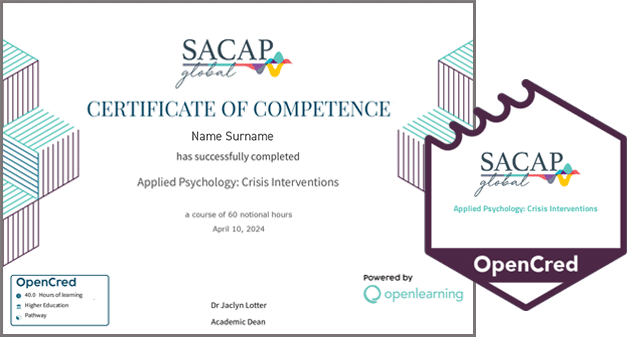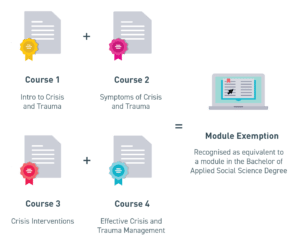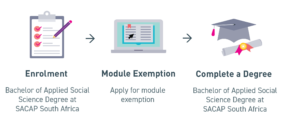Crisis Interventions
R 4,620.00

Take the Course
Crisis InterventionsR 4,620.00
Details
Start Date
12 May 2025End Date
22 June 2025duration
6 weeks-
 Register now. Pay later. 0% Interest.Split into interest free payments.
Register now. Pay later. 0% Interest.Split into interest free payments. -
 Scan to pay.Scan the QR code to pay.
Scan to pay.Scan the QR code to pay. -

 Credit and debit card.Pay using your credit or debit card.
Credit and debit card.Pay using your credit or debit card. -
 Visa Click to Pay.Pay with credit, debit or prepaid card.
Visa Click to Pay.Pay with credit, debit or prepaid card.
Course Overview
Many people who experience a traumatic event will go on with their lives without lasting negative effects, while others will experience traumatic stress reactions.
The Crisis Interventions micro-credential will introduce you to the application of various methodologies and intervention strategies in different and unique crisis and trauma situations.
This 6-week introductory course will enhance your knowledge and understanding of crisis and trauma. You will explore various crisis and trauma interventions and you will learn how to apply them to different and unique crises.
Crisis and trauma counselling is a specialised targeted intervention that provides a framework to identify which methodologies are most effective in their application. You will gain an understanding of the rationale behind methodologies that are appropriate to use in different crisis and trauma counselling scenarios.
TRIGGER WARNING: This course includes readings, media and discussions around the topic of crisis and trauma, including rape trauma and partner violence. We acknowledge that this content may be difficult and triggering to some. We encourage you to be mindful of your own well-being as you process the content.
Note: Counselling skills training is required to assist people in crisis and trauma. This course does not address counselling skills training. It focuses on the context of crises and trauma.
Time commitment per week
An average of 10 – 13 hours weekly.
Is this course for you?
This course is for you if you already have counselling skills and want to enhance your skills by exploring specialised crisis and trauma counselling interventions.
What are Crisis Interventions?
Crisis Interventions are management techniques aimed at preventing or reducing potential permanent damage to an individual who has suffered a crisis. A crisis is defined as an overwhelming event, such as divorce, violence, the death of a loved one or finding out that the individual or a loved one suffers from a serious illness.
For more information on how to deal with crisis and trauma read our blog post.
Dates
- Class of 2025 May: 12 May– 22 June
- Class of 2025 August: 11 August – 21 September
There are no online classes. Course content is released on a weekly basis. This will allow you to work through the course material at a time that is most convenient for you, while still meeting the weekly targets on time.
Learner Experience
Certification
Upon completion, you will receive a digital certificate of competence and badge. Your certificate and badge can be shared on 100+ social media platforms, allowing you to share your achievement with a single click.

Credential Type
The OpenLearning team has reviewed this course to ensure quality academic learning within the Malaysian and Australian credentialing framework.
An OpenLearning OpenCred is a type of credential that can stand-alone, or it can interact with a formal qualification. OpenCred courses are market-leading online courses aimed at preparing learners for the future of work.
This course has been designed and developed by experts in the field of psychology. The Crisis Interventions micro-credential course is for anyone needing to up-skill in this area and offers 40 hours of indispensable learning and assessment.
Learners study online with peers and receive robust academic content while acquiring practical industry-relevant skills.
OpenCreds
Completing this course leads to obtaining an OpenCred.
- 40 hours of learning
- OpenCred classification: Pathway
Stackable Credentials
Stack specified combinations of micro-credentials and they can be recognised as equivalent to a module within the Bachelor of Applied Social Science Degree at SACAP.
Intro to Crisis & Trauma can be stacked with Symptoms of Crisis & Trauma and Crisis Interventions and Effective Crisis & Trauma Management, and if you meet the minimum entrance criteria, you can enrol for the Bachelor of Applied Social Science Degree and apply for module exemption.
What You’ll Need
- Access to Microsoft Word
- Google Chrome (recommended)
- Stable internet connection
What You’ll Learn
Over the course of six (6) weeks, through videos, readings and discussions, you will explore the following topics:
- Week 1: Crisis and the Process of Assessment
- Week 2: The ABC Model and Triage Assessment System
- Week 3: Psychobiological and Emotional State Assessment
- Week 4: The Six-Step Model and Psychological First Aid
- Week 5: Brief and Strength-Based Interventions
- Week 6: The Narrative Approach and Wits Trauma Model
Course Outcomes
By the end of this course, you will be able to:
- Define the term ‘crisis’ and the way it can impact an individual or community.
- Describe assessment in relation to crisis management.
- Assess the severity of a crisis and apply the ABCs of assessing a crisis.
- Understand the triage assessment system for suicide or self-harm.
- Explore psychobiological assessment.
- Assess a client’s current emotional functioning, alternatives, coping mechanisms and support systems.
- Apply the Psychological First Aid intervention technique for crisis management.
- Learn the six-step model of crisis intervention.
- Describe the use of Brief Intervention techniques in crisis Intervention.
- Understand the use of strength-based crisis intervention strategies in crisis management.
- Describe a narrative therapeutic approach to crisis intervention.
- Discuss the Wits Trauma Model and its application.
You will have also created an invaluable portfolio of evidence, which you can use to demonstrate your understanding and knowledge of Crisis and Trauma methodologies and intervention strategies.
The Team
Our short course developers and assessors are expert practitioners. They have been selected for the breadth and depth of experience in their respective disciplines. The team loves sharing their knowledge and online learning expertise to help you get the most out of your learning journey.

Broaden your knowledge of emotional functioning and coping mechanisms for victims of trauma.
Identify which methodologies are most effective in their application.
Apply various Crisis and Trauma methodologies and intervention strategies



